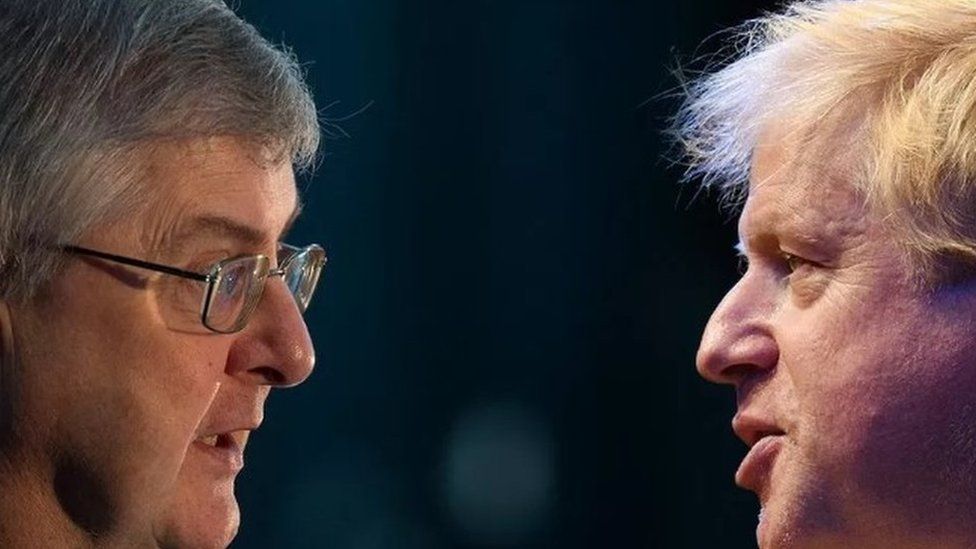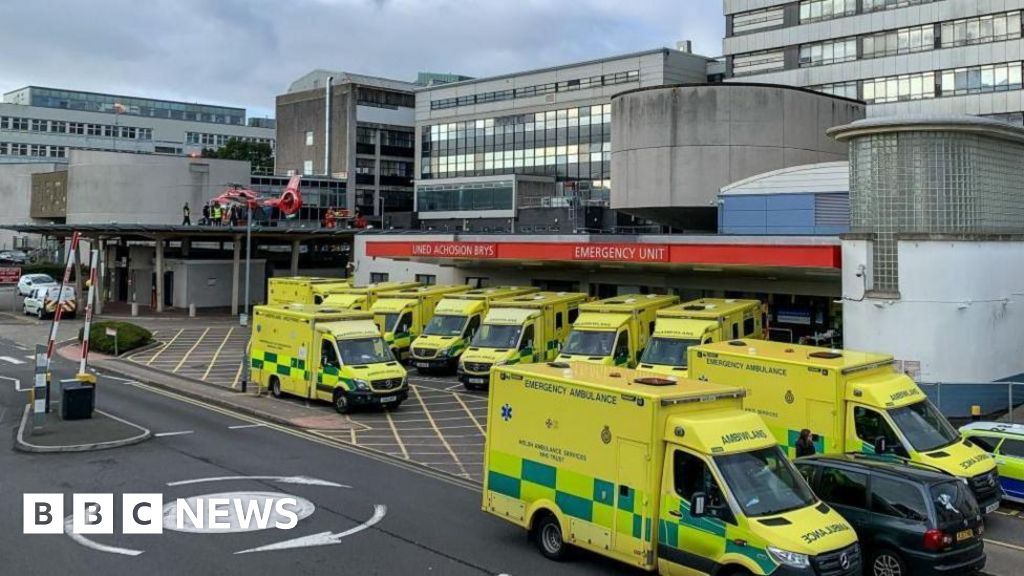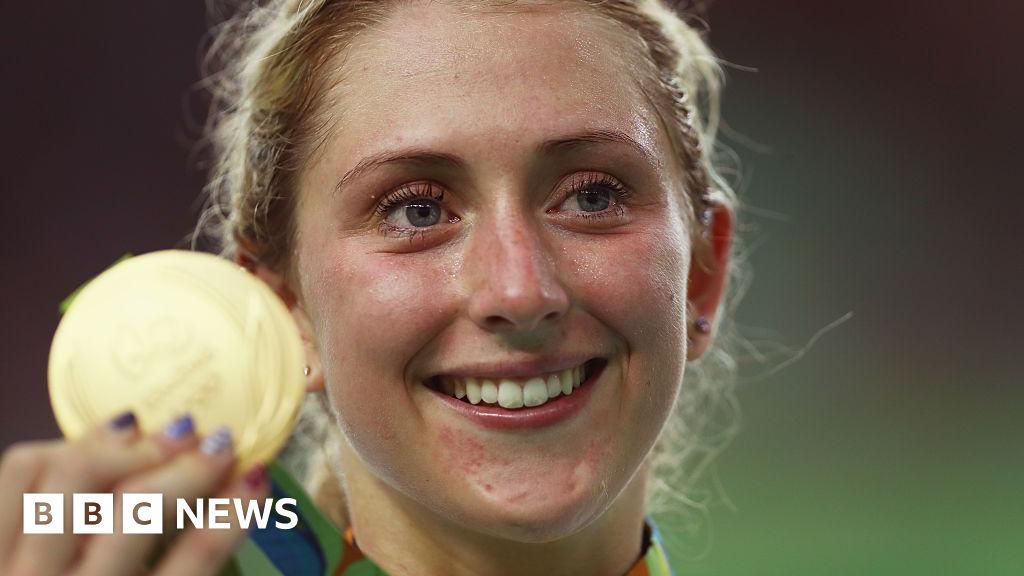 Image source, Getty Images
Image source, Getty Images
The First Minister Mark Drakeford said Boris Johnson said "we must carry on, we must tell people this is a mild illness, they're not to get anxious about it"
Boris Johnson was like an "absent" football manager during Covid, an inquiry has heard.
First Minister Mark Drakeford criticised the former prime minister's leadership during the pandemic.
He also said Johnson made comments "designed to minimise the seriousness" of Covid at the beginning.
Mr Drakeford's comments came on the penultimate day of the UK inquiry's Welsh module in Cardiff as he gave a whole day of evidence.
In a written statement to the inquiry, Mr Drakeford described Michael Gove, who was minister for the Cabinet Office during the early part of the pandemic as "a centre forward without a team behind him, and where the manager was largely absent".
At the inquiry, Mr Drakeford said: "The absent manager was the prime minister because he was never in these meetings or at the table, and while Mr Gove was a senior minister… he has influence rather than the determinative impact which a message from the prime minister would have."
Image source, PA Media
Image caption,Mark Drakeford was giving evidence on the 11th day of the Welsh module of the Covid Inquiry
He added he would have liked to have seen Johnson chairing Cobra meetings sooner in the pandemic.
He said it would not necessarily change actions taken, but would have "sent a stronger signal about the seriousness with which the gathering storm was being taken".
But it was put to Drakeford that his own absences from the first three Cobra meetings indicated a similar lack of serious approach being taken in Wales
He argued that at that stage it was a "health dominated" matter, requiring health advisors and decision-makers.
He also said Johnson "deliberately" made it unclear lockdown rules only applied to England.
He told the inquiry the heads of the devolved nations had told the then-prime minister he needed to be clear in a press conference that changes to rules in the pandemic only applied to England.
Mark Drakeford at UK inquiry's Welsh module
"[We said] he must make clear that what he is about to say does not apply to Scotland or Wales or Northern Ireland, and he gives assurance in the Cobra meeting that he will do his very best to make sure that he does that.
"He then heads to the cameras, and provides a script which the only time he refers to Scotland, Wales and Northern Ireland is when he says early in the press conference 'as the prime minister of Scotland, Wales and Northern Ireland'.
"It is a very clear indication to people that what he's about to say applied to the whole of the United Kingdom, and he never once says that is not the case."
Drakeford described this as a "bleak moment" and "deliberate".
The first minister also referenced a message the then-UK health secretary, Matt Hancock, had sent to Michael Gove which incorrectly stated public health was not devolved.
He added this showed a "lack of clarity" over the legislative basis for powers that would be needed to deal with the pandemic.
Image source, UK Covid-19 Inquiry
Image caption,The outgoing first minister was grilled over Wales' strategy and actions during the pandemic
"My belief right up until 20 March [three days before the first lockdown], is that the essential decisions would remain in the hands of the UK government and that devolved governments would be implementers of those decisions," he said.
He added it was "pretty alarming" this was still being resolved on 20 March.
Mr Drakeford told the inquiry mass gatherings were allowed during the early stages of the pandemic because Dominic Cummings refused to stop them.
He said large events, such as the Cheltenham Festival, were allowed to run at the start of the pandemic despite him arguing "mass gatherings should not go ahead" because Boris Johnson's former advisor dismissed the idea.
He added he made the argument in a Cobra meeting on 12 March, weeks before the first lockdown.
"In this discussion, the prime minister did go around the room, he took views from anybody who wanted to contribute and in that discussion I was arguing for a four-nation agreement that mass gatherings would not go ahead.
"The reason I have such a vivid memory of it is that having gone around the table the prime minister summed up against that course of action by saying: 'Dom says no'. That was his final contribution.
"I did not know who Dom was at this point," Mr Drakeford added.
First Minister Mark Drakeford says he only used WhatsApp 11 times during the whole of the pandemic
He described the introduction of international travel lists in the summer of 2021 as "chaotic and shambolic" because of the "pace at which changes are made".
Mr Drakeford told the inquiry he asked for decisions on travel be taken on a UK-wide basis and not without the agreement of devolved administrations.
"In this area, the Welsh government only had theoretical powers of agency because most people who travel abroad from Wales don't do so from Wales and back to Wales.
"So, in effect, we simply had to do whatever the UK government decided."
Mr Drakeford also told the inquiry he regretted everything that had led to loss of life in care homes during Covid.
He said there were not enough Covid tests to do "all we'd like to have done with them".
"Of course, there are instances where coronavirus is seeded into care homes by people being discharged from hospital, but the primary reason why coronavirus ends up in a care home is because of the necessary ingress into care homes of people who are there to care for people there.
"As coronavirus rises in the community, the risk that it will be carried into a care home in that way increases."
He dismissed calls for a UK-wide response in the event of a future pandemic.
"I don't think the evidence suggests to me that the decisions made in London would have been better decisions as far as Wales is concerned," he said.
"I definitely don't agree that better decisions would have been made from Whitehall than in Wales."
He added he would have welcomed a "strengthened ability to co-ordinate" between the four nations.
The Welsh module of the UK Covid Inquiry concludes on Thursday.
 (1).png)
 9 months ago
13
9 months ago
13













